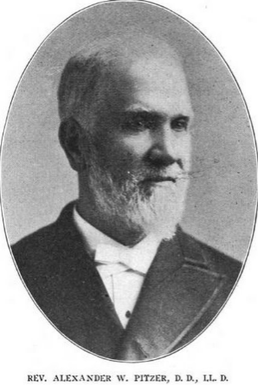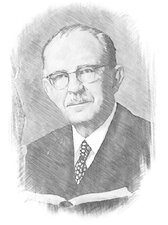I Peter 1
|
I Peter 1:8:
Whom having not seen, ye love; in whom, though now ye see him not, yet believing, ye rejoice with joy unspeakable and full of glory – 1 Peter 1:8 |
 Steve Gallagher
Steve Gallagher
"It would be good to note what Paul said about the place which fantasy plays in establishing and maintaining a stronghold. The enemy will maintain his position to the extent that the believer continues to entertain sexual fantasies. Paul tells to cast those imaginations down. It may take time before the main has a pure thought life, but it is vital that he begins to exercise mental discipline now. Peter said, "Therefore, gird your minds for action, keep sober in spirit, fix your hope completely on the grace to be brought to you at the revelation of Jesus Christ."
--Steve Gallagher; At The Altar of Sexual Idolatry
--Steve Gallagher; At The Altar of Sexual Idolatry

Note...where this battle for holiness begins. It’s the believer’s mind that must be readied for war. When we strive to live holy lives, we often begin by attempting to curtail sinful behaviors: I should swear less. I should stop spending impulsively.
But Peter points us to the source of our sin: our thoughts. Every sinful action we engage in is the result of a sinful thought that fed a sinful desire. If we want to set our hope fully on grace, we must deal with our sin at the source.
Temptation presents itself to the mind as a reasonable choice. We allow our thoughts to dwell on its reasonableness, fueling our desires. And as James tells us, “Desire when it has conceived gives birth to sin, and sin when it is fully grown brings forth death” (James 1:15). For this reason, Paul admonishes us to seek transformation not through the renewing of our actions or our desires, but through the renewing of our minds (Rom. 12:2) -Jen Wilkin; Gospel Coalition
But Peter points us to the source of our sin: our thoughts. Every sinful action we engage in is the result of a sinful thought that fed a sinful desire. If we want to set our hope fully on grace, we must deal with our sin at the source.
Temptation presents itself to the mind as a reasonable choice. We allow our thoughts to dwell on its reasonableness, fueling our desires. And as James tells us, “Desire when it has conceived gives birth to sin, and sin when it is fully grown brings forth death” (James 1:15). For this reason, Paul admonishes us to seek transformation not through the renewing of our actions or our desires, but through the renewing of our minds (Rom. 12:2) -Jen Wilkin; Gospel Coalition
 John Piper
John Piper
Then comes the main verb, and for the first time in this letter it's an imperative. It's a command: "Hope fully." Or: "Fix your hope completely." So the first command in this letter is an action you do with your mind and your heart. It's a command to hope. Hope is not an action of the body. It is an experience of the soul. Peter is commanding us to experience hope.
This is the main verb, the main clause, in this verse. The first two were subordinate participles: "Having girded the loins of your mind"—that's the first one; and "being sober"—that's the second one. Then comes the main predicate; "Hope fully!" Which simply means that girding up the loins of the mind and being sober are means to the end of the main thing, namely, hoping fully. -John Piper; Desiring God
This is the main verb, the main clause, in this verse. The first two were subordinate participles: "Having girded the loins of your mind"—that's the first one; and "being sober"—that's the second one. Then comes the main predicate; "Hope fully!" Which simply means that girding up the loins of the mind and being sober are means to the end of the main thing, namely, hoping fully. -John Piper; Desiring God

I Peter 1:13:
Therefore, gird your minds for action, keep sober in spirit, fix your hope fully on the grace to be brought to you at the revelation of Jesus Christ
It’s interesting that Peter includes the word “fully” at all. Why not just tell us to set our hope on the grace that will be brought to us? Why “set our hope fully on grace”? Because it’s possible, and indeed common, for the believer to function as one with a hope placed partially on grace and partially elsewhere. We’re prone to placing our hope on our own good deeds, or on a spouse or our children, or on a pastor or president. We may place it on a bank account or a career, or even on the size of our social media accounts. We tell ourselves that we hope in Christ, but what we mean is that we hope in Christ and __________. -Jen Wilkin
Therefore, gird your minds for action, keep sober in spirit, fix your hope fully on the grace to be brought to you at the revelation of Jesus Christ
It’s interesting that Peter includes the word “fully” at all. Why not just tell us to set our hope on the grace that will be brought to us? Why “set our hope fully on grace”? Because it’s possible, and indeed common, for the believer to function as one with a hope placed partially on grace and partially elsewhere. We’re prone to placing our hope on our own good deeds, or on a spouse or our children, or on a pastor or president. We may place it on a bank account or a career, or even on the size of our social media accounts. We tell ourselves that we hope in Christ, but what we mean is that we hope in Christ and __________. -Jen Wilkin

“Wherefore gird up the loins of your mind.” Unless you know something about Greco-Roman culture back in the First Century when Brother Peter wrote these words, it’s hard to know just what he is telling us. What does he mean by “gird up”; and what are “the loins of your mind”?
To gird up means to bind about, especially with a belt. The picture here is one of a Roman soldier putting on the part of his armor that covered the groin or loins. The phrase “the loins of your mind” is much more difficult to understand.
For the meaning of that phrase, we must know how first century folks understood both “loins” and “mind.” The loins were the center of procreative power — which is the literal translation of the Greek root used here. The Greek root used here for “mind” is one which means deep thought. So, what we have here in “gird up the loins of your mind” is a phrase that means the mind in its full capacity, strength or power.
What Brother Peter is telling us to do here is to gird up, or bind, as with a belt, our full mental capacity or strength. Now, in English, this doesn’t seem to make a lot of sense. After all, the mind is not something around which you would put a belt. So, we have to forget our modern understanding and the limits that occur when translating from one language to another.
Wherefore gird up the loins of your mind, be sober, and hope to the end for the grace that is to be brought unto you at the revelation of Jesus Christ; as obedient children, not fashioning yourselves according to the former lusts in your ignorance: but as He which hath called you is holy, so be ye holy in all manner of conversation; because it is written, Be ye holy; for I am holy. (1 Peter 1:13-16 KJV)
We start with an image in our minds that closely approximates what Brother Peter is telling us. That image comes from the concept of girding up. As I said earlier, it is the image of a Roman soldier putting on a piece of his armor which is fastened with belts, such as the piece that covered his groin.
This, itself, requires at least some understanding of the cultures and practices in the time during which Peter wrote. We would have no understanding of what a Roman soldier’s armor looks like without the availability of historical accounts and descriptions of armor in the New Testament (see Ephesians 6:10-18 KJV).
But, because we do have such information available, we can get an idea of what Brother Peter is saying in this portion of his first epistle. And, as I also said earlier, we have to look at how someone in the first century would have understood what Brother Peter was writing here. -Rev Chancellor Carlyle Roberts II
To gird up means to bind about, especially with a belt. The picture here is one of a Roman soldier putting on the part of his armor that covered the groin or loins. The phrase “the loins of your mind” is much more difficult to understand.
For the meaning of that phrase, we must know how first century folks understood both “loins” and “mind.” The loins were the center of procreative power — which is the literal translation of the Greek root used here. The Greek root used here for “mind” is one which means deep thought. So, what we have here in “gird up the loins of your mind” is a phrase that means the mind in its full capacity, strength or power.
What Brother Peter is telling us to do here is to gird up, or bind, as with a belt, our full mental capacity or strength. Now, in English, this doesn’t seem to make a lot of sense. After all, the mind is not something around which you would put a belt. So, we have to forget our modern understanding and the limits that occur when translating from one language to another.
Wherefore gird up the loins of your mind, be sober, and hope to the end for the grace that is to be brought unto you at the revelation of Jesus Christ; as obedient children, not fashioning yourselves according to the former lusts in your ignorance: but as He which hath called you is holy, so be ye holy in all manner of conversation; because it is written, Be ye holy; for I am holy. (1 Peter 1:13-16 KJV)
We start with an image in our minds that closely approximates what Brother Peter is telling us. That image comes from the concept of girding up. As I said earlier, it is the image of a Roman soldier putting on a piece of his armor which is fastened with belts, such as the piece that covered his groin.
This, itself, requires at least some understanding of the cultures and practices in the time during which Peter wrote. We would have no understanding of what a Roman soldier’s armor looks like without the availability of historical accounts and descriptions of armor in the New Testament (see Ephesians 6:10-18 KJV).
But, because we do have such information available, we can get an idea of what Brother Peter is saying in this portion of his first epistle. And, as I also said earlier, we have to look at how someone in the first century would have understood what Brother Peter was writing here. -Rev Chancellor Carlyle Roberts II
|
I Peter 1:22:
Since you have purified your souls in obeying the truth through the Spirit in sincere love of the brethren, love one another fervently with a pure heart, |
|
|
1 Peter 1:23 - 25:
having been born again, not of corruptible seed but incorruptible, through the word of God which lives and abides forever, because All flesh is as grass, And all the glory of man as the flower of the grass. The grass withers, And its flower falls away, But the word of the LORD endures forever. Now this is the word which by the gospel was preached to you." |
We are so temporal in this existence. Here today and then gone from this earth. In the grand concept of "time," we are but like the grass. The Word of God, which we heard, produced our faith in the first place. This Word of God will also preserve us and keep us in the faith. The word breeds prayer and praying increases our faith. Never allow anything to take the place of God's Word in your life for it is the source of your faith. The mystery of faith is hidden in the Word. It does something in your heart that your mind and intellect is not always aware of. The word and the Lord are the same: they both stand forever.
|
 John Samson
John Samson
It is not the church that gave us our Bible, rather it is our Bible the gave us the church. When the church made a list of the inspired Scriptures, these were already acknowledged to be so in the Christian community. The Church did not stand over the Scripture in authority but submitted to them, using the Latin phrase “Recipimus” meaning “We Receive.” That is vital to understand. The Scriptures are self authenticating, having their source in God. The church merely recognized and received the word of God. God created the world by His word and creates Christians the same way – “For you have been born again, not of perishable seed, but of imperishable, through the living and enduring word of God.” (1 Peter 1:23) – John Samson

"There is a growing impression among eminent private thinkers that Christianity is losing its hold upon men, and that the Church is a waning power; that the religious world is drifting from its moorings, and faith is becoming atra-dition of the past."
The above quotation is from an editorial in the most popular newspaper published at the Capital of the United States. If the faith of the Church is to stand in the wisdom of men, then it will be the sport of every wind of doctrine, and bedriven hither and thither, according to the course of the popular tide; and if the Church has no better anchor than the wisdom of this world, then, indeed, will it drift from all its moorings, and be tossed continually upon the seas of ceaseless speculation. But if faith is to stand, not in the wisdom of men, but in the power of God, in the sure Word of Truth that liveth and abideth forever, then, like its Divine Author, it is and will be the same yesterday, today, and forever. If faith be founded upon the Word of Eternal Truth, then the Church has an anchor sure and stedfast, entering into that within the veil. One prophecy of Daniel is fulfilled: "Many shall run to and fro, and knowledge shall be increased". The world has never witnessed a period of such incessant and intense mental activity." AW Pitzer; The Wisdom of this wordl; [c]1912
The above quotation is from an editorial in the most popular newspaper published at the Capital of the United States. If the faith of the Church is to stand in the wisdom of men, then it will be the sport of every wind of doctrine, and bedriven hither and thither, according to the course of the popular tide; and if the Church has no better anchor than the wisdom of this world, then, indeed, will it drift from all its moorings, and be tossed continually upon the seas of ceaseless speculation. But if faith is to stand, not in the wisdom of men, but in the power of God, in the sure Word of Truth that liveth and abideth forever, then, like its Divine Author, it is and will be the same yesterday, today, and forever. If faith be founded upon the Word of Eternal Truth, then the Church has an anchor sure and stedfast, entering into that within the veil. One prophecy of Daniel is fulfilled: "Many shall run to and fro, and knowledge shall be increased". The world has never witnessed a period of such incessant and intense mental activity." AW Pitzer; The Wisdom of this wordl; [c]1912
















